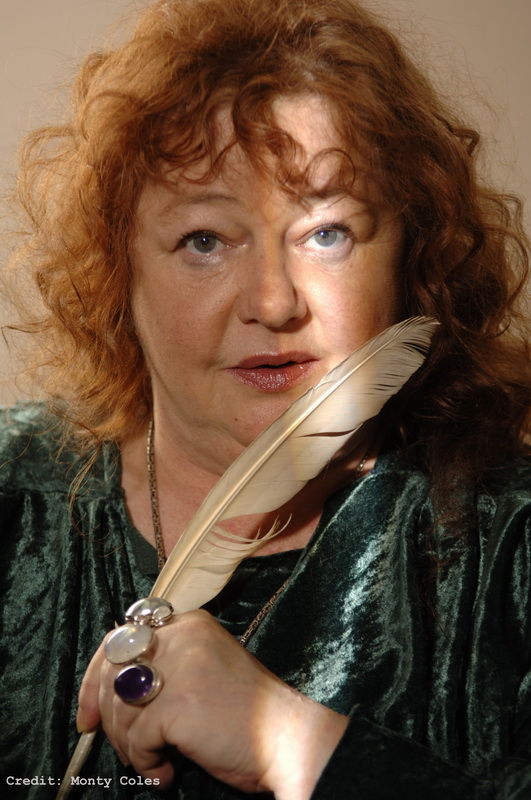Kerry Greenwood
 | Kerry GreenwoodBio: Kerry Greenwood is an author and lawyer. She is most well-known for the Phryne Fisher series of historical detective novels, now made into a TV series. I stayed usefully angry for yearsThe day I started at Geelong Road State School, I hung on tightly to my mother's finger thinking ''I'm not going to like this!''. A boy fell over in front of me and grazed his knee on the asphalt. I was so small that I felt I was looking into a world of knees. I remember I was wearing a hand-me-down dress which was just awful. It was yellow and had an orangeade stain that refused to wash out. I was just about to tell my mother that perhaps an education wasn't such a good idea when I noticed a Greek girl in a purple velveteen dress with orange skyrockets painted on it. It was even worse than mine and I felt an instant bonding with her. Her name was Themetrula Georgeovasilopoulos and she was to become my best friend. She still is. I had enjoyed an extremely happy childhood but I felt like an alien at school on that first day. Everyone looked so fierce and dangerous and loud. And there was Themy and suddenly I liked school! I became an honorary wog, even though I was small with golden hair and blue eyes. I had learnt to read when I was at home but nobody at school believed I could read. They thought I had learnt the text by rote. My third grade teacher, my absolutely best teacher, was Bill Witherspoon. He handed me a newspaper and I read it and, in return, he gave me the best present anyone could give me the key to the bookcase. I read Wind In the Willows, Winnie The Pooh, Enid Blyton! I had never been given such a wonderful present. Later in life, when I became a lawyer, I was on the radio and told the story of receiving the key to that bookcase and Mr Witherspoon rang up. I still find it hard to call him Bill. I thought he was really tall but he was not much taller than me. He was a wonderful teacher. I loved playing gutterball, a real western suburbs game, where you bounced a tennis ball at different angles. Hopscotch and skippy were also popular games. The games ended when I started at Maribyrnong High School. I got a huge kick out of high school because they pretty much let me do what I wanted to do - put on plays, do translations. I did a translation of Moliere's That Scoundrel Scapin. Every writer has a teacher of English who influences him or her. In my case it was Henry Mullens, known as Moon Mullens, who was from Fitzgerald, Georgia, in the US. We used to tell him that we loved his southern drawl but he would always tell us that we spoke with an accent and we sounded funny. He adored Hemingway and I didn't but I started reading a lot of Hemingway so I could argue with him. He made me read a whole lot of books I would never have thought to read and he was the first person who allowed us to argue with him. He encouraged us to be strong-minded and opinionated. He was interested in Australians and we were fascinated with him. It was a totally different dynamic to anything we had experienced because he was so curious about us. Of course most teachers were not interested in us because they were us. He was a complete outsider and he taught us a totally different way of looking at things. I remember once the class was singing Marching Through Georgia and he erupted into the music lesson. He was a tall, rounded man and he immediately demanded to know what we knew of Sherman's march into Georgia. He then proceeded to teach us about that period in the Civil War, about Robert E. Lee and the Confederacy and it was just riveting. Nobody had ever taught history like that to us before. It was as if he had travelled through a time machine. When I published my first book, I received a note from him from his home in Canada. It said: "You are the other half of Kerry and Themy. You were the one who always argued with me". The subjects I enjoyed at school were English, history and drama. I was awful at maths. I had a score of 17 out of 100 and I think that was for writing my name on the paper. A career teacher visited us in grade 4 and, having looked at my marks, told me I should look for work in Coles or Myer. I said I wanted to be a lawyer and he laughed at me. I stayed usefully angry for two years because I was so affronted by him. Why did he laugh? I was a girl, I still am! There were nine women in the intake of 200 to law. I was the only one who had not been to a private school. What made my high school good was that they taught us how to learn, how to analyse the universe and how to deal with difficult people, and how to deal with bullies and how to get out from under a difficult situation. It was mildly rough but not really rough. Printed in THE EDUCATION AGE in February 2005 |